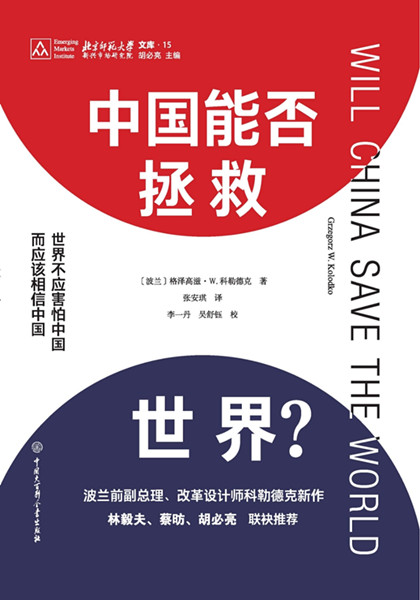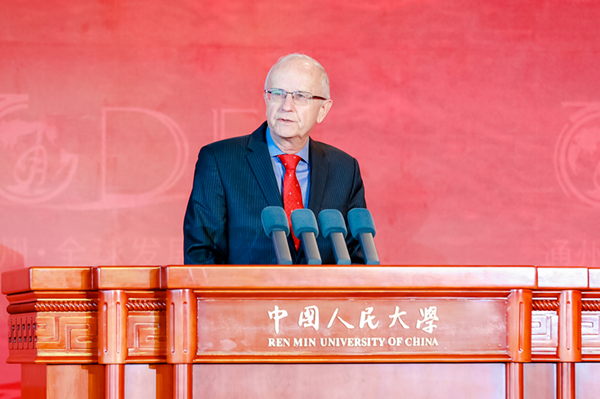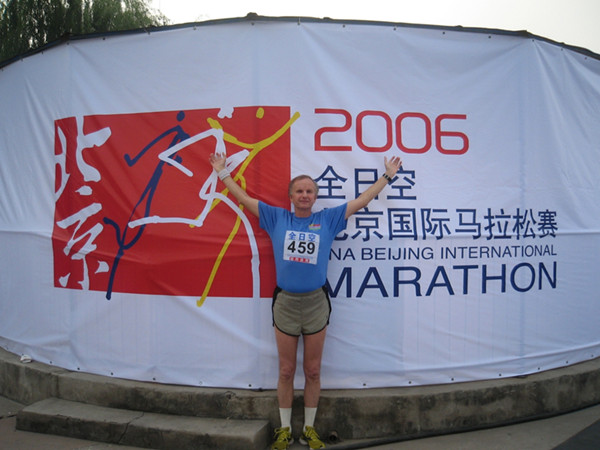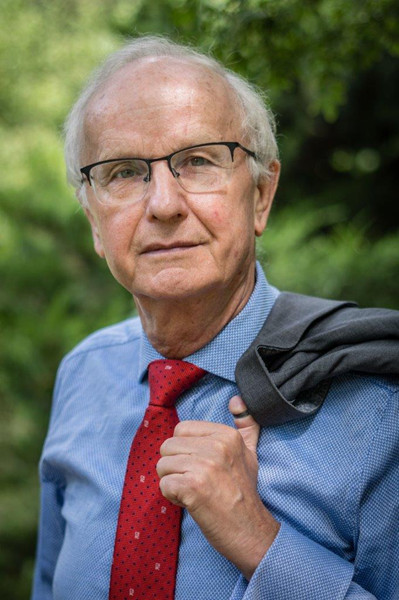(W.E. Talk) Former deputy premier of Poland: Sustainable development is a no-ending story

By Cui Bailu & Wang Zonghan from CNS
Grzegorz Kolodko, born in 1949, is the former deputy premier and the former minister of finance of Poland in 1994-1997 and 2002-2003. He is a distinguished professor of economics, also the author of “New Pragmatism”.
Grzegorz Kolodko is the founder and director of TIGER (Transformation, Integration, and Globalization Economic Research) at Kozminski University in Warsaw. He has served as a consultant to international organizations such as the IMF, World Bank, UN, and the OECD.
Sustainable development, as a consensus of the world, is also a global issue and an eternal topic to the development of human society. Grzegorz Kolodko, the former deputy premier of Poland, had an exclusive interview with CNS’s “W.E. Talk”. During his attendance to the second “Tongzhou Global Development Forum” hold by Renmin University of China, Grzegorz Kolodko shared his opinions on Chinese modernization and sustainable development with “W.E. Talk”. He believes that sustainable development is a no-ending story, and China will share more experience to other developing countries by achieving the Chinese modernization.

Here are the excerpts of the interview:
CNS: You were the former deputy premier and minister of finance of Poland in 1994-1997 and 2002-2003. During your tenure, Poland’s economy has grown rapidly. In your opinion, what has contributed to the success of Poland's economic?
Grzegorz Kolodko: I am a professor of economics. Because my policy-oriented research, I was invited several times to join politics and I was deputy prime minister and minister of financing for different governments of the left of the center orientation. I think Poland’s success is based on a knowledge-based policy, taking advantage of ongoing globalization.
A liberal and open Polish economy helps to share the fruits of ongoing globalization. But since we decided to join the EU (European Union), we had to design the structural reforms and institutional building in such a way that it will fit in the legal framework of the EU. Now Poland is considered to be a star performer of the East European economies. Currently, as the result of these reforms, we are the fastest growing economy within the European union.
I’m proud to be an architect of the Polish economic success, but it is already history. Now we have the new challenges, such as low inflation and the problem of the influx of the immigrants. As a professor of social sciences, I wish there will be more knowledge-based policy. That is the set of the challenges which we do have, but I hope we’ll meet them. It is not easy, but it is possible.
CNS: What’s your opinion about China’s economic development and Chinese path to modernization?
Grzegorz Kolodko: The first question is what’s the meaning of modernization. We were talking about reforms and structural change also institutional building. Now we have “modernization”, which is a very comprehensive term. It means technological modernization, institutional modernization, also economic policy modernization.
Therefore, the second question is what’s the aim of the modernization. My understanding of Chinese modernization is double. First, it is to sustain or even to raise in the longer competitiveness of Chinese economy within the framework in the situation of irreversible globalization. And second aim target of Chinese modernization is to sustain the improvement of the well-being of the Chinese people. So to make China be competitive in the global dimension, while making the society satisfied in the domestic dimension, I think that it is absolutely indispensable and it is going by and large in a good way. Although some part of this modernization has been taken late, for example dealing with the environmental problems happened in China, it is going quite good. It’s appreciated in China that the combination of the invisible power of hands of market with the visible power of hands of government, coordinates the policy response to these challenges.
Chinese modernization fits in with my theory of New Pragmatism, which combines economic development with social development and environmental protection. Economy, society and ecology are interconnected. New Pragmatism suggests that if modernization implies a good synergy of this three aspects, then you will succeed even more than you have succeeded so far.

CNS: At present, many scholars express their concerns about the implementation of the United Nations 2030 Sustainable Development Goals (SDGs). What are the challenges in achieving the SDGs? What should we do now?
Grzegorz Kolodko: The project of Millennium Development Goals (MDGS) was launched in 2000, which is a remarkable step for redefining the targets of development policy to get rid of the narrow-minded thinking on the maximalization of production, but to take care of other goals on the consequences of the economic activity, of business, of people, of industries, et cetera.
China, which is one of the most biggest economies in the world, is giving a good example. China has accomplished much more towards the end of fulfilling these duties and obligations meeting these goals, even much than richer countries of Western Europe, North America, or Japan, South Korea, et cetera.
The global issues are driving our attention to the issues in which otherwise can be overseen, such as gender equality, clean water or health care. But now we have more people living in extreme poverty than only couple of years ago. Therefore, I think that it calls simply for more coordination within the United Nations system and within the regions, for instance, within BRICS, EU or ASEAN.
When the year 2030 comes, you will see UN declare the Sustainable Development Goals aiming for 2050. As a marathon runner, I believe that there’s an end for a marathon race, but not for the sustainable development. It is a no-ending story. Because on the one hand, we are polluting our environment, on the other hand, we are making more effort to clean it; on the one hand, we are aging and some people are getting sick, on the other hand, we have made multiple progress on health care, et cetera. China has contributed to the accomplishment of these goals significantly. China is giving very many other countries how to coordinate policies to be more successful in implementation of these development goals.
CNS: How do you see the contradiction between green transformation and economic growth?
Grzegorz Kolodko: If there are not contradictions, then we do not need economists. Otherwise, there is the cost of achieving something is the relation between the input and output. cleaning the environment, green transition, protection, the nature is costly. It has implications of income distribution on taxation, unemployment, et cetera. Economics as a science is proposing for the political leaders to know how to govern, how to manage, how to coordinate these policies. We all know that we have to take care of shifting to renewable resources of energy to green transition. But it is costly. I think that so called “PPP”―“public, private, partnership”―is a good vehicle to facilitate faster transition to green economy.
China has made a tremendous progress on the green economy. Flowers brushes trees have been planted and they are growing. And they are natural instruments of absorbing CO2, which our economic activity is emitting to the atmosphere.
We are talking so much about a necessity to shift the green energy that is also including the cars in certain countries. It had been decided already that the new combustion engine cars will be not registered and now they try to delay this date to 2030 or 2035.
The only solution is to accelerate the process of modernization, if you wish of these industries in the western part of the world to compete fairly and honestly with China. If you will take a look in the longer run, take a look for last 25 years of globalization, China was rising, and it was good for development also in the so-called rich West. But the logic of politics is different than the logic of economics. That is one more time why I’m calling for knowledge-based policy and taking advantage of my New Pragmatism, which is policy-oriented economic theory.
CNS: How to strengthen practical cooperation between China and Europe?
Grzegorz Kolodko: The cooperation between european union and china is very good for both and it will continue yet. It's a bumpy road. It is not going as smooth as this table. So most of the time there are the good news, but from time to time, there are the problems out coming from misunderstanding all from conflict of interest.
If there is the conflict of interest, there is only one way which is actually occurring contemporary negotiations: to be honest to say what do you want, and to find a pragmatic compromise, pragmatic compromise, which is acceptable for both. Do not to use tariffs or sanctions or go to the trade war, because an action provokes a reaction.
For the people of media and the people of academia, we have to explain to our readers, to our viewers, to our students that why did things work the way they do. Because it is much more complex than just to say that somebody is bad or has about wrong intentions, et cetera. It is coming out of the natural conflict of interests which are solvable in the longer run. So the relations between EU and China will improve in the longer run.
CNS: As an economist, do you believe in the power of cultural exchange? How can cultural exchange change the world? And what measures do you think should be taken to strengthen cultural exchanges among countries?
Grzegorz Kolodko: It’s absolutely fundamental to do more cultural exchanges. For instance, the Belt and Road Initiative is not only about the investment in infrastructure such as road rail tracks, harbors and airports, energy and grid, et cetera, but also human capital. I’m very happy that I’m teaching international students at Beijing Normal University. Soon I will have my class on geopolitical changes in economic development, which is also a kind of cultural exchanges. Recently I was watching a couple of movies within on framework of Chinese movies festival in Poland. And even more recently, we did have music ensemble from China, and now we are very happy that China has liberalized the visa system that people from many countries can come without applying to get visa. Because the most important thing of cultural exchanges is people’s communication and exchange.
But if you go to the bookstore in New York or Berlin or Warsaw, you will find that there’s few contemporary literature translated from Chinese. We don’t translate enough what the Chinese writers are writing. We do not listen enough to the contemporary Chinese music,et cetera. There is a great progress as far as students exchange are concerned. We have also a few students from China in my country of Poland, but I wish we’ll have much more of them in the future. If one follows only the picture presented by media in, he will find those pictures are very biased. The best way of understanding each other is to travel, to see, to discuss, to touch it.
We should give more attention to the cultural exchanges. For myself, I do pay great attention to the cultural exchange. It helps people to understand each other. As a teacher,I’d like to teach people to respect the difference that sometimes you behave differently, you argue differently, you have different ideas, different customs, et cetera. Difference is said to be a creative force at most of the time. And cultural exchange is an essential way to see, to understand and to appreciate the difference.
Edited by Wang Zonghan
2024.11.27

